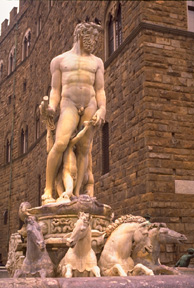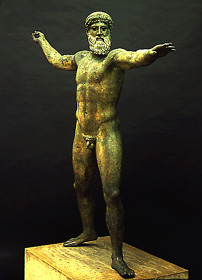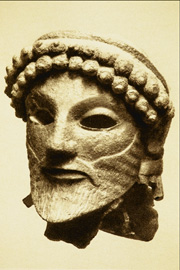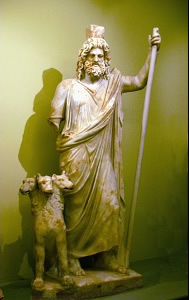Hades and Cerberus, his three-headed dog, in the museum of Archeology in Crete.
Image courtesy of Aviad Bublil. Creative Commons Attribution 3.0 Unported license.
Pluto
Following the defeat of the Titans by the Jovian gods, Pluto obtained the
kingdom of the underworld. One day, while he was riding through the field of battle,
the goddess
Venus had her companion, Cupid, playfully shoot an arrow into the heart of Pluto.
Struck by Cupid's arrow, Pluto fell in love with the first young lady he saw, who happened to be Persephone. Pluto promptly carried her off into the underworld to be his bride.
Dead souls were escorted to the shores of the River Styx by Mercury
, where they were received
by the boatman Charon, who rowed them across the River Styx to Pluto's kingdom.
Many characters throughout Roman myth crossed the path of Pluto. Ulysses, the famous greek hero, entered the realm to speek to lost souls. He spoke to his dear friend Tiresias, who told him his destiny. He also came across his dead mother, Anticlea, and the great warrior, Achilles. Ulysses was the only one to successfully make a trip to Hades and return to Earth.
You might also be interested in:

What types of instructional experiences help K-8 students learn science with understanding? What do science educators teachers, teacher leaders, science specialists, professional development staff, curriculum designers, school administrators need to know to create and support such experiences?
...more
Persephone was the Greek goddess of the Underworld and the wife of Hades. Hades fell in love with her after seeing her picking flowers in a plain in Sicily. He decided at once to abduct her and carry
...more
The legendary Greek hero, Odysseus was the king of Ithaca, a small island in the Ionian sea, where he lived with his wife Penelope. He was known to Romans as Ulysses. After fighting the war against the
...more
In Roman mythology, Jupiter was the king of heaven and Earth and of all the Olympian gods. He was also known as the god of justice. He was named king of the gods in the special meeting that followed his
...more
Neptune was the name that ancient Romans gave to the Greek god of the sea and earthquakes, Poseidon. He was the brother of Jupiter (Zeus) and of Pluto (Hades). After the defeat of their father Saturn (Cronos),
...more
Poseidon was the Greek god of the sea and earthquakes. Poseidon was depicted as a bearded man with long hair, holding a trident and accompanied by dolphins and fish. He had the reputation for having a
...more
In Greek mythology, Zeus (Jupiter in Roman mythology) was the king of heaven and Earth and of all the Olympian gods. He was also known as the god of justice. He was named king of the gods in the special
...more
Igneous rocks form when molten rock cools and solidifies. Molten rock is called magma when it is below the Earth’s surface and lava when it is above. There are two types of igneous rocks, depending on
...more















